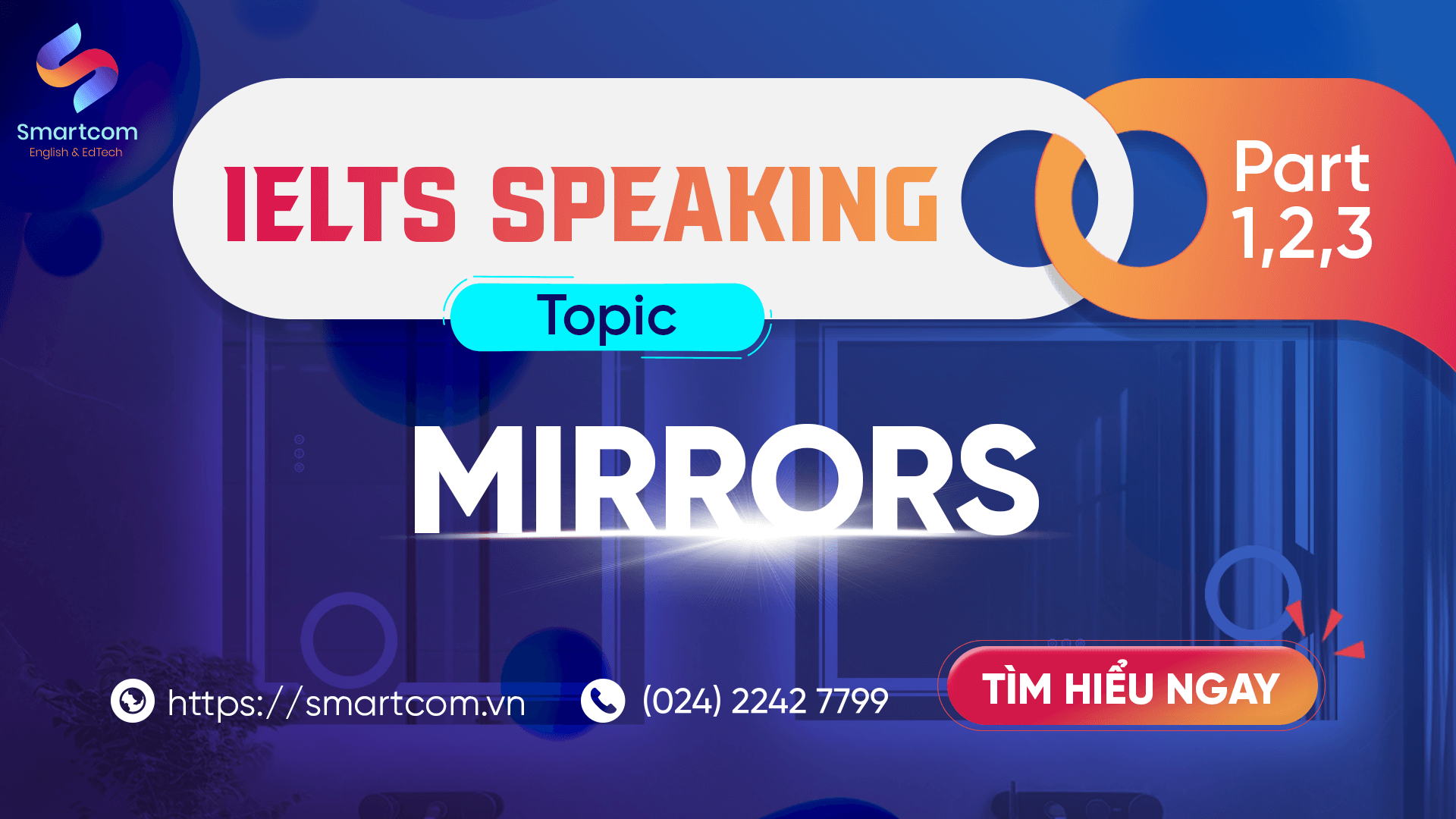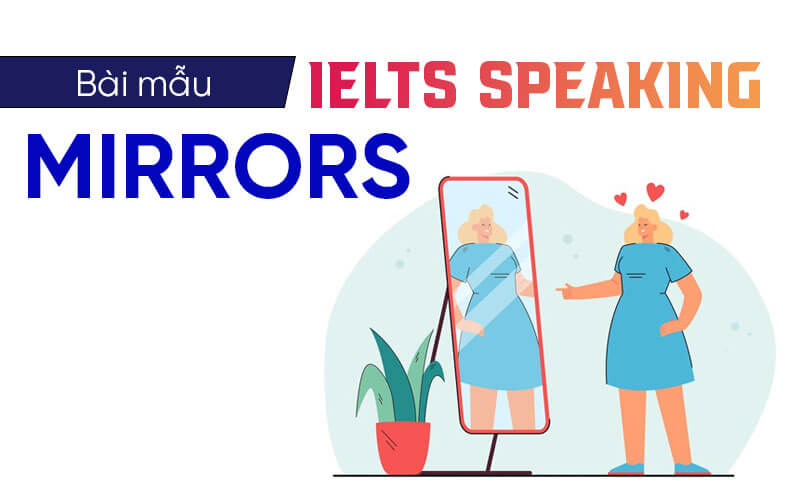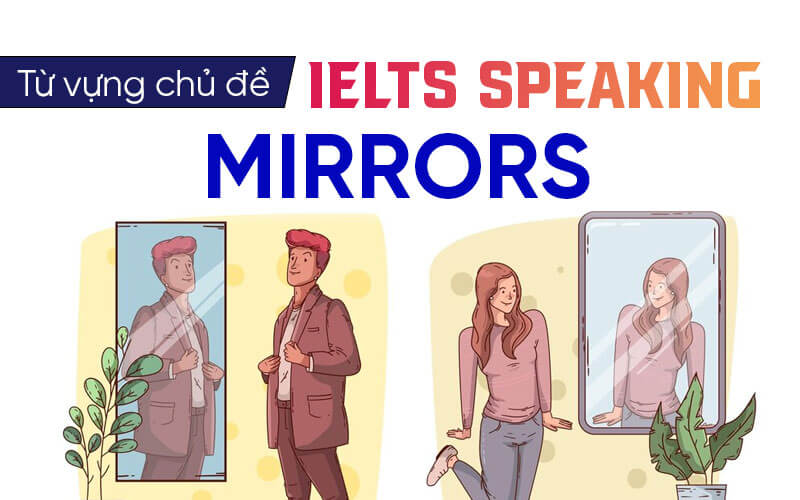Đội ngũ chuyên gia tại Smartcom English là tập hợp những chuyên gia đầu ngành trong lĩnh vực IELTS nói riêng và tiếng Anh nói chung. Với phương pháp giảng dạy sáng tạo, kết hợp với công nghệ AI, chúng tôi mang đến những trải nghiệm học tập độc đáo và hiệu quả. Mục tiêu lớn nhất của Smartcom Team là xây dựng một thế hệ trẻ tự tin, làm chủ ngôn ngữ và sẵn sàng vươn ra thế giới.
Mirror (Gương) một chủ đề khá thú vị và thường xuất hiện trong phần thi IELTS Speaking. Đây không chỉ là một vật dụng quen thuộc trong cuộc sống hằng ngày mà còn mang nhiều ý nghĩa văn hóa và tâm lý. Việc chuẩn bị kỹ lưỡng từ vựng, cấu trúc câu và ý tưởng trả lời sẽ giúp bạn ghi điểm ấn tượng với giám khảo.
Trong bài viết này, Smartcom English sẽ cung cấp cho bạn bộ câu hỏi mẫu của IELTS Speaking Mirrors trong cả ba phần (Part 1, Part 2, Part 3), kèm theo câu trả lời chất lượng cao và từ vựng ghi điểm. Hãy cùng khám phá để nâng band điểm Speaking của bạn ngay hôm nay!

Bài mẫu IELTS Speaking Mirrors Part 1
1. Do you like looking at yourself in the mirror?
Yes, I do. Looking in the mirror helps me check my appearance before going out. It gives me confidence, ensuring I look neat and presentable. However, I try not to obsess over my reflection since excessive self-focus can sometimes lead to self-consciousness.
2. Have you ever bought a mirror?
Yes, I have. I purchased a full-length mirror for my bedroom because I needed a proper one to check my outfits. Additionally, mirrors can make a room look more spacious and aesthetically pleasing.
3. Do you think mirrors are necessary in daily life?
Absolutely. Mirrors are essential for personal grooming, interior design, and even driving. They also play a role in certain cultural beliefs, where they are thought to bring positive energy and ward off negativity.
4. Do you think mirrors make rooms look more spacious?
Yes, definitely. Strategically placed mirrors reflect light, creating an illusion of space. This trick is commonly used in interior design, especially in small apartments or offices.

Bài mẫu IELTS Speaking Mirrors Part 2
Describe a time when you used a mirror
You should say:
- When it was
- Where you were
- Why you used the mirror
- And explain how you felt about it
Sample Answer:
Well, mirrors are an indispensable part of daily life, and I find myself using them quite often. However, one particular instance that stands out vividly in my memory is the time I had to prepare for an important presentation at my university during my final year.
It happened about two years ago when I was about to deliver a research presentation in front of my professors and peers. Since I was aware that non-verbal communication plays a crucial role in public speaking, I decided to rehearse in front of a full-length mirror in my room to refine my gestures, posture, and facial expressions. I remember standing there, carefully observing myself, making adjustments to ensure that my body language exuded confidence and professionalism.
The main reason I used the mirror was to work on my self-presentation skills. I had read somewhere that practicing in front of a mirror helps in improving articulation, as one becomes more conscious of facial expressions and lip movements. Moreover, as someone who occasionally struggles with stage fright, I found that looking at myself while speaking aloud helped me gain a sense of control over my nerves. It was almost like having an objective observer, allowing me to recognize and rectify any awkward movements or mannerisms that could undermine my delivery.
Reflecting on that experience, I would say it was incredibly beneficial. Not only did it boost my confidence, but it also helped me refine my speaking style. I could see tangible improvements in the way I projected my voice, maintained eye contact, and conveyed enthusiasm through my expressions. Ultimately, the practice paid off, as my presentation went smoothly, and I received positive feedback from both my professors and classmates.
From that day onward, I have incorporated the habit of using mirrors as a self-improvement tool. Whether it’s for rehearsing a speech, evaluating my posture, or simply ensuring that I look presentable before an important event, I now see mirrors as more than just a reflection of my physical appearance—they are an essential aid in enhancing my confidence and overall presence.
Vocabulary Highlights:
- Indispensable part of daily life – Một phần không thể thiếu trong cuộc sống hằng ngày
- Non-verbal communication – Giao tiếp phi ngôn ngữ
- Rehearse in front of a mirror – Luyện tập trước gương
- Exude confidence and professionalism – Toát lên sự tự tin và chuyên nghiệp
- Self-presentation skills – Kỹ năng thể hiện bản thân
- Articulation – Cách phát âm, diễn đạt rõ ràng
- Stage fright – Chứng sợ sân khấu
- Objective observer – Người quan sát khách quan
- Tangible improvements – Những cải thiện rõ ràng, có thể thấy được
- Project one’s voice – Truyền tải giọng nói mạnh mẽ
Bài mẫu IELTS Speaking Mirrors Part 3
1. Why do people use mirrors?
Mirrors serve multiple purposes in daily life. They are primarily used for personal grooming, but they also have applications in interior design, security, and even in vehicles to improve road safety. Additionally, some people believe in the spiritual or cultural significance of mirrors, such as their role in Feng Shui.
2. Do you think mirrors are important for self-confidence?
Yes, to some extent. A well-groomed reflection can boost confidence, making people feel more prepared for social interactions. However, excessive reliance on mirrors might lead to vanity or self-doubt, especially in today’s image-conscious society.
3. Do you think mirrors reflect reality, or do they distort it?
It depends. Standard mirrors provide a fairly accurate reflection, but factors like lighting and angles can affect how we see ourselves. Psychological factors also influence perception, as people often view themselves differently based on mood and self-esteem.
Xem thêm:
IELTS Speaking Place of Work & Study
IELTS Speaking Good View – Chủ Đề Part 1, 2, 3
IELTS Speaking part 1,2,3 chủ đề Accommodation
Từ vựng chủ đề IELTS Speaking Mirrors
- Reflection (n): Hình ảnh phản chiếu
Example: The mirror gave a clear reflection of her outfit.
- Well-groomed (adj): Chỉnh chu, gọn gàng
Example: He always makes sure he looks well-groomed before attending an event.
- Aesthetic (adj): Mang tính thẩm mỹ
Example: Mirrors add aesthetic value to a room by making it look more spacious.
- Illusion of space (n): Ảo giác về không gian
Example: Large mirrors create an illusion of space, making small rooms appear bigger.
- Symbolic meaning (n): Ý nghĩa tượng trưng
Example: In Feng Shui, mirrors have a symbolic meaning related to energy flow.
- Self-consciousness (n): Sự tự ý thức (về ngoại hình)
Example: Constantly checking the mirror may lead to self-consciousness.
- Perseverance (n): Sự kiên trì, bền bỉ
Example: Her graduation was a result of years of perseverance and dedication.
- Distort (v): Làm méo mó, bóp méo
Example: Some mirrors distort the reflection, making people look taller or wider.
- Psychological factors (n): Các yếu tố tâm lý
Example: Psychological factors influence how people perceive themselves in the mirror.
- Ward off (v): Xua đuổi, tránh xa
Example: Some cultures believe that mirrors can ward off bad luck.

Kết bài
Trên đây là tổng hợp những câu trả lời mẫu cho chủ đề IELTS Speaking Mirrors cùng từ vựng ghi điểm cao. Việc nâng cao vốn từ vựng và luyện tập trả lời một cách logic sẽ giúp bạn đạt điểm cao trong kỳ thi IELTS.
Muốn đạt IELTS cao nhưng vẫn tiết kiệm thời gian và chi phí? Đã đến lúc ngừng tìm kiếm nên học IELTS ở đâu hay chi phí học IELTS có hợp lý không. Smartcom English có đầy đủ câu trả lời – cam kết lộ trình, đầu ra rõ ràng.
Bạn đã sẵn sàng nâng trình IELTS Speaking cùng Smartcom English chưa? Hãy tham gia ngay khoá học IELTS chuyên sâu tại Smartcom English để có cơ hội được đồng hành cùng thầy Nguyễn Anh Đức- tốt nghiệp Đại học Harvard, tác gỉa bộ sách nổi tiếng ‘’Luyện siêu trí nhớ từ vựng tiếng Anh theo phương pháp Do Thái’’ và các giáo viên giàu kinh nghiệm khác để đạt điểm cao nhất trong kỳ thi IELTS của bạn nha!
Kết nối với mình qua
Bài viết khác


![[PDF + Audio] Tải Sách IELTS Cambridge 19 (Kèm đáp án)](https://smartcom.vn/blog/wp-content/uploads/2024/06/ielts-cambridge-19_optimized.png)


![[PDF + Audio] Tải Sách IELTS Cambridge 17 (Kèm đáp án)](https://smartcom.vn/blog/wp-content/uploads/2024/07/sach-ielts-cambridge-17_optimized.jpg)

![[PDF + Audio] Tải Sách IELTS Cambridge 15 (Kèm đáp án)](https://smartcom.vn/blog/wp-content/uploads/2024/07/ielts-cambridge-15_optimized.jpg)








